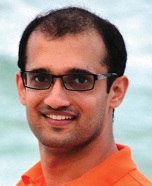
Abstract:
Human sensing encompasses a range of sensing tasks including (but not limited to) recognizing gestures and activities of daily living, monitoring vitals, and even identifying mood. It is the key enabler of a countless number of applications in diverse domains, such as health care monitoring, sleep monitoring, fitness tracking, immersive gaming, and elderly care. Due to the innumerable ways in which human sensing can improve the quality and experience of life in today’s smart environments, coupled with the ever improving sensing hardware and novel sensing modalities, human sensing is attracting more and more interest from both academia and industry.
Over the past few years, a new class of human sensing systems has spawned that use WiFi signals to perform human sensing. The fundamental principle that enables human sensing using WiFi signals is that when a user moves in a wireless channel, his/her movements cause the wireless channel metrics (WCMs), such as channel state information, received signal strength, and angle-of-arrival of the signal, to change. The patterns of change in WCMs are unique for different human movements. By learning these patterns of change for any given movement, a WiFi-based human sensing system can recognize that movement.
In this talk, I will present our work on recognizing human gestures using WiFi. I will also describe our attempts to address some of the practical challenges facing WiFi based human sensing, such as sensitivity of these systems to positions and orientations of users, and simultaneous movements of multiple users. I will conclude with a discussion about further challenges that need to be addressed before WiFi based human sensing systems can be used in real-world settings.
Bio: Muhammad Shahzad is an Assistant Professor at the Department of Computer Science, North Carolina State University. He received his PhD from Michigan State University in 2015. His research interests are in the areas of ubiquitous sensing, RFID systems, and network measurements. To date, his work on WiFi based human sensing has involved recognition of macro human movements such as gestures and activities and micro human movements such as keystrokes and gait. Dr. Shahzad and his team won the Spectrum Sharing Radio Challenge (2016). He was also the recipient of the Fitch Beach Award (2015) and Human Competitive Award (2009).

